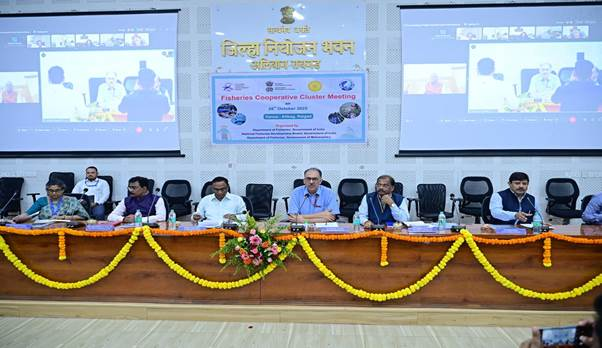Raigad Fisheries Cluster Showcased as Model for Cooperative-Led Blue Economy
The visit underlined the Government of India’s growing focus on cooperative-led integrated value-chain development as a central strategy for transforming the fisheries sector into a vibrant pillar of India’s economy.

- Country:
- India
In a major boost to India's Blue Economy vision, Dr. Abhilaksh Likhi, Union Secretary of the Department of Fisheries (DoF) under the Ministry of Fisheries, Animal Husbandry & Dairying, visited the Fisheries Cooperative Cluster in Raigad, Maharashtra on October 27, 2025. The visit was aimed at reviewing the progress of the Raigad Cluster—designated under the Pradhan Mantri Matsya Sampada Yojana (PMMSY)—and engaging directly with grassroots stakeholders involved in fisheries-based livelihoods.
The visit underlined the Government of India's growing focus on cooperative-led integrated value-chain development as a central strategy for transforming the fisheries sector into a vibrant pillar of India's economy.
A Consultative Push for Grassroots Development
During the site visit, Dr. Likhi interacted with 251 members from 156 Primary Fisheries Cooperative Societies (PFCSs) and 9 Fish Farmer Producer Organizations (FFPOs) across Raigad district. He emphasized that cooperative structures are essential to ensuring inclusivity, resilience, and sustainability in the fisheries value chain.
Highlighting the government's commitment to "Sahkar se Samriddhi" (Prosperity through Cooperation), Dr. Likhi directed the National Fisheries Development Board (NFDB) to organize awareness campaigns, training programs, and grievance redressal camps in every taluka of Raigad to expand the reach of schemes like PMMSY and the Fisheries Infrastructure Development Fund (FIDF).
He assured stakeholders that infrastructure gaps—including the demand for fishing jetties, cold chains, ice plants, cold storage, and dredging facilities—would be prioritized in upcoming project proposals. The consultation marks the beginning of a multi-phase planning process designed to shape localised, need-based strategies for fisheries development.
Institutional Convergence and Policy Alignment
Joining the session virtually, Shri Sagar Mehra, Joint Secretary (Inland Fisheries), called for greater inter-ministerial convergence to ensure a holistic and sustainable model of fisheries growth. He recommended a technology-enabled, convergence-based project approach to bring long-term viability and value addition to inland fisheries enterprises.
Ms. Neetu Kumari, Joint Secretary (Marine Fisheries), provided insights into the preparation of Standard Operating Procedures (SoPs) for harbour and landing centre management. These SoPs aim to empower cooperatives to play a lead role in daily operations and governance of fisheries infrastructure, with the support of agencies like NCDC, the Ministry of Cooperation, and other institutional partners.
Dr. B.K. Behera, Chief Executive of NFDB, presented Raigad's fisheries sector profile and outlined key interventions planned for the next five years. These include investment in infrastructure under PMMSY Phase 2, building robust market linkages, supporting cold chain and processing units, and enabling welfare-centric programs for fishers and their families.
Grassroots Voices Highlight Key Needs and Innovations
Fisheries stakeholders from the marine, freshwater, and brackish water sectors shared challenges, success stories, and policy suggestions. Major recommendations included:
-
Enhanced credit linkages for small-scale fishers
-
Exposure visits to successful fisheries models in Andhra Pradesh
-
Women-centric initiatives, including health camps, sanitation facilities, and inclusion in fisheries cooperatives
-
Skill development and digital financial literacy training
Representatives from MPEDA, NABARD, ICAR, and state departments affirmed their commitment to supporting Raigad's fisheries stakeholders through collaborative and capacity-building efforts.
Why Fisheries Clusters Matter
The Raigad Cooperative Cluster is one of 34 fisheries clusters notified under PMMSY. These clusters are designed as engines of inclusive and sustainable economic growth, integrating activities across aquaculture, mariculture, and deep-sea fishing. The cluster model promotes:
-
Economies of scale and collective bargaining power
-
Integration of backward and forward linkages—from production and harvesting to processing and export
-
Adoption of technology and modern practices
-
Entrepreneurship, innovation, and cooperative start-ups
-
Skilling and workforce development
By strengthening these clusters, the Department of Fisheries is aiming to build a competitive and organized fisheries sector that delivers enhanced livelihoods, global competitiveness, and sustainable resource management.
Multi-Stakeholder Collaboration for Blue Economy Goals
The success of the Raigad cluster is a result of multi-level collaboration among the Department of Fisheries (GoI), the Department of Fisheries (Maharashtra), NCDC, MPEDA, NFDB, and other national and local institutions. Coordination with the Ministry of Food Processing Industries, Ministry of MSME, and financial institutions like NABARD is helping to unlock investment and innovation.
The interaction was also attended by Shri Kishan Rao Jawale, District Collector, Raigad; and Shri Kishore Tawade, Commissioner of Fisheries, Maharashtra. They pledged continued support to develop Raigad as a model fisheries development district in India.
Towards a Resilient Fisheries Future
The Raigad Fisheries Cluster exemplifies how cooperative-led, cluster-based, technology-driven development can align with national priorities like Atmanirbhar Bharat, Blue Economy, and Sahkar se Samriddhi. With growing focus on export orientation, sustainability, and innovation, India's fisheries sector is being positioned not just as a source of livelihood, but as a strategic pillar of national and regional development.








